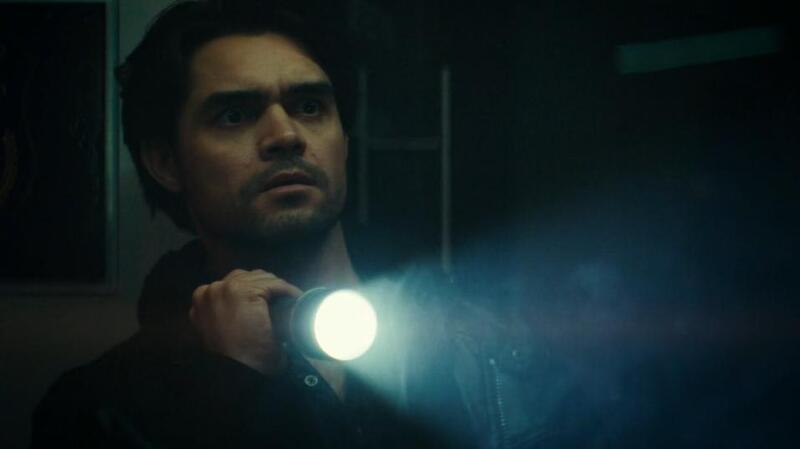
Displaced in Time, Rooted in Emotion
MOVIE REVIEW
Nova
–
Genre: Drama, Romance, Sci-Fi, Short
Year Released: 2023
Runtime: 9m
Director(s): Tristan Anthony Ortiz
Writer(s): Tristan Anthony Ortiz
Cast: Gracie Holland, Chris Maher, Natalie Veater
Where To Watch: TBA
RAVING REVIEW: Imagine waking up one day and realizing the world went ahead without you—and you didn’t even get the memo. That's the jumping-off point in a sci-fi drama without flashy effects or convoluted time loops. Instead, it turns its focus inward, where the stakes are personal, the pain is quiet, and the urgency is emotional. This one opts for something softer, stranger, and ultimately more human in a genre that often leans on spectacle.
NOVA opens with what feels like a classic space-launch scenario—ambitious astronaut, concerned partner, big dreams, and an uncertain future. Miles Nova is ready for liftoff, while his wife Stella is stuck with a sense of dread she can’t shake. That worry becomes all too real when Miles disappears mid-mission. There's no wreckage, no aftermath—just absence. Then, in a twist that isn’t treated like a big reveal but rather a haunting return, Miles reemerges decades later, physically unchanged while everything else has moved forward without him.
The hook might be high-concept, but the execution is purposefully grounded. Director Tristan Anthony Ortiz bypasses the usual science fiction tropes—the explanations, the paradox debates, the hyper-designed future—and focuses entirely on the emotional aftermath. NOVA doesn’t ask what caused the time shift; it asks what that shift does to a person. The result is less about alternate timelines and more about emotional recalibration.
Ortiz’s decision to strip the story of unnecessary exposition and lean into the emotional core gives it traction. This is a sci-fi narrative told with the tone of an indie character drama. The story isn’t concerned with building out the tech or the future—it's more interested in how a man stumbles through the present when the past is all he remembers. Even the cinematography reflects this, with compositions frequently isolating Miles in the frame. His surroundings feel familiar but alien—much like how the film positions the concept of home.
Chris Maher delivers a performance that lives in the silences. There are no sweeping monologues or teary confessions. He portrays Miles as someone trying to figure out how to grieve when he’s lost something he didn’t even know was gone. The performance relies on body language, glances, and stillness more than dialogue, and that decision makes his confusion and sorrow feel genuine. It's a character who doesn’t want sympathy, just something that makes sense.
The emotional impact doesn’t rest on Maher alone. Natalie Vester’s Stella carries the weight of time. Though not the central focus, her presence serves as an emotional compass. She’s not stuck in the past like Miles—she’s someone who’s lived through absence, endured grief, and adapted. Her character is treated with care; she’s not reduced to memory or martyrdom. That choice avoids melodrama and adds authenticity to the larger narrative.
What’s refreshing is how much trust the film puts in the viewer. NOVA doesn’t overexplain or spoon-feed its emotions. It invites you to observe, listen, and fill in the gaps. That kind of patience is increasingly rare. Ortiz creates space for ambiguity, and even when that means leaving some questions unanswered, the emotional throughline never gets lost.
Visually, the film keeps things simple. The production design avoids futuristic flash and instead uses recognizable settings that feel unfamiliar enough to be disconcerting. The decision not to go overboard with digital effects or sprawling landscapes pays off—it keeps the viewer's attention centered where it belongs: on the characters. This future isn’t about what technology can do but what time has done.
Ortiz’s background in narrative and documentary filmmaking is evident in how the film balances personal stories with a broader sense of disconnection. His direction resists the temptation to go big, favoring authenticity over spectacle. It’s not trying to dazzle you; it’s asking you to sit in the discomfort.
There’s something uniquely moving about watching a story that understands grief isn’t a clean line or a puzzle to solve. NOVA captures that uncertainty—the discomfort of change, the ache of things unsaid, and the strangeness of finding purpose after everything’s shifted. It’s not interested in closure. Maybe that’s the point.
This story keeps its voice low, but its impact lasts. In the end, the message it leaves behind is quiet but undeniable: sometimes, the hardest part of returning isn’t finding your way—realizing the path you knew no longer exists.
Please visit https://linktr.ee/overlyhonestr for more reviews.
You can follow me on Letterboxd, Instagram, Twitter, and YouTube. My social media accounts can also be found on most platforms by searching Overly Honest Reviews.
I’m always happy to hear from my readers; please say hi or send me any questions about movies.
[photo courtesy of DEEP BLUE PICTURES]
DISCLAIMER:
At Overly Honest Movie Reviews, we value honesty and transparency. Occasionally, we receive free items for review, including DVDs, Blu-rays, CDs, Vinyl, Books, etc. We assure you that these arrangements do not influence our reviews, as we are committed to providing unbiased and sincere evaluations. We aim to help you make informed entertainment choices regardless of our relationship with distributors or producers.
Amazon Affiliate Links:
Additionally, this site contains Amazon affiliate links. If you purchase through these links, we may receive a commission. This affiliate arrangement does not affect our commitment to honest reviews and helps support our site. We appreciate your trust and support in navigating these links.



Average Rating